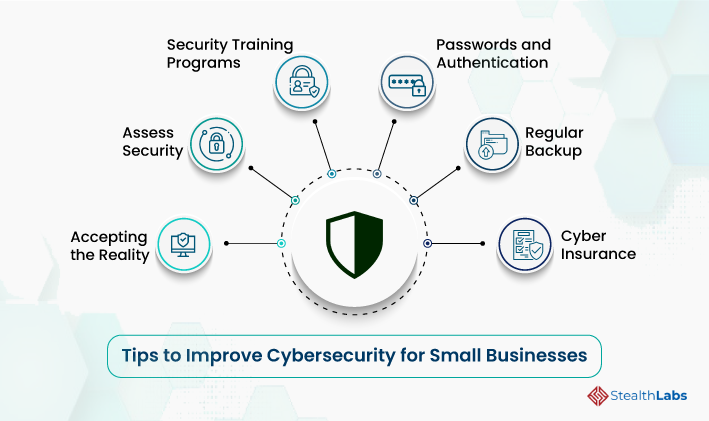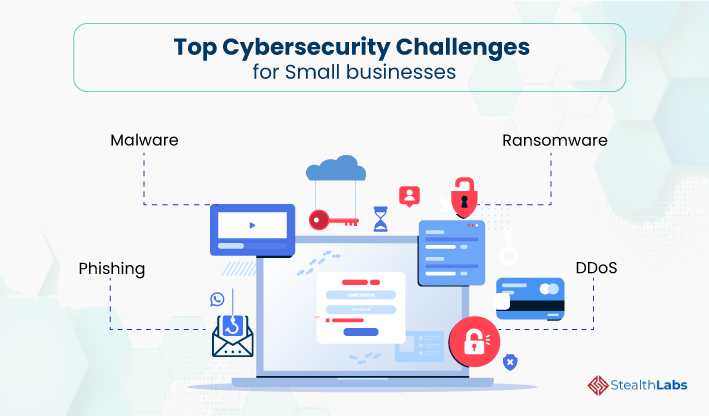Cybersecurity for Small Business: Overview, Importance, Challenges and Tips
‘Cybersecurity’ has always been the greatest challenge and it is not going to be different in the present speed-driven digital world. In fact, cybersecurity has become an indispensable aspect of every business strategy.
The rapid technological advancement driven by global connectivity and usage of cloud services has brought with it a rise in cybercrime in modern IT.
Whether it’s securing the plethora of connected devices or protecting personal data, there is no shortage of challenges for the cybersecurity team to deal with.
According to the Cyber Security Breaches Survey 2018, 43% of businesses were a victim of a cyber security breach in the last 12 months.
Organizations of all sizes in every industry across the world are under the continuous threat of cybercrime.
No business is too small to be at risk of a cybersecurity attack, it does happen to small businesses too.
According to the 2019 Identity Breach Report, the targeted cyberattacks on small businesses grew at a daunting rate in 2018, up nearly 425% from the previous year.
Despite the festering statistics, many small organizations tend to overlook the importance of cybersecurity in their business processes.
[ALSO READ: Top Cybersecurity ‘Trends’ to Watch in 2020]
Why Small Businesses Ignore Cybersecurity?

Small business entrepreneurs strive to grow their business and gain a footprint in the global market. They often have more than one thing on their plate to deal with. With their keen focus on customers and revenue, the entrepreneurs also involved in every decision making across the hierarchy.
This, in turn, fades away the importance of security function in small businesses.
Moreover, the budget constraints impede the adoption of robust security software in Small Businesses Enterprises (SBE). In the same line, they may not leverage an experienced IT department.
Many small business owners think that they’re less of a target for cybercriminals as their market radar is too small.
A recent survey of 400 small firms found that 27% of them have no cybersecurity protocols at all. And, 25% of them have difficulty implementing even the most basic security including routinely backing up their data.
However, these aspects don’t make cybersecurity any less important for small businesses.
Importance of Cybersecurity in Small Business

Whether it is a budget constrain or intentional decision for overlooking cybersecurity, it is to be acknowledged that small businesses witness a hefty blow when hit with a cyberattack.
Around 60% of small businesses collapse within 6 months of a cyberattack due to lost revenue, customer goodwill and large unplanned IT recovery costs.
Cybercriminals know the fact that small scale business has direct or indirect business relationships with larger organizations. So, the cybercriminals focus on small businesses as a gateway into larger organizations, as the cybersecurity at small firms is typically less robust than that of large firms.
The cybercriminals who have stolen 70 million individuals’ personal information at the US retail giant Target in November 2013, gained the access by attacking the small business that the giant used for heating and air conditioning services.
Cybersecurity is clearly a common concern of businesses of all sizes. However, cybersecurity represents a real and very pernicious threat, especially to small businesses.
Apart from incurring significant revenue loss due to cyberattacks, the small business also loses the thrust of their potential customers.
Moreover, in order to continue the business, they must restore their reputation while scrambling to regain financial stability.
According to the report by Kaspersky Lab, the average cost of a breach for a small business is about USD 38,000, a hefty amount to cope up.
In the need of the hour, we bring you some basic and affordable cybersecurity tips that can make a huge difference in the security posture of the small businesses.
[ALSO READ: 2020 Information Security Conferences in USA]
Tips to Improve Cybersecurity for Small Businesses

1) Accepting the Reality
The foremost step in strengthening your cybersecurity is to accept the reality that you are a target to the cybercriminals. Acknowledge the fact that every organization, regardless of its size, can be a potential target for cybercriminals and no industry is out of their radar.
Even the small businesses face the same threat landscape that challenges the large organizations.
2) Assess Security
It is imperative to know the security gaps in your network even if you have implemented some basic security steps including a firewall and anti-virus. Performing an internal and external security assessment will help you in determining the vulnerable spots and the necessary remedial steps to be taken.
It can be adopting stringent security regulations and data backup procedures, among others.
3) Security Training Programs
The organization should regularly conduct training programs for the employees to understand the concept of spam, phishing, spear phishing, malware and ransomware. Ensure that employees follow basic security practices and policies.
4) Passwords and Authentication
Implement strong password policy to ensure employees use unique passwords and change the passwords on a scheduled basis. Try to deploy multi-factor authentication that requires additional information in addition to a password to gain access.
5) Regular Backup
It’s imperative for small businesses with few security policies to regularly backup the data. Implementing a sound backup policy that includes scheduled backup routines and verification testing proves to be promising in the long run.
The recent backup data plays a crucial role in running your business when the essential data becomes inaccessible due to cyberattacks.
6) Cyber Insurance
With the rapid technological advancements, cyberattacks have become inevitable. The security breach can incur a hefty loss to the organization, sometimes putting them out of business.
Having cyber insurance is the best strategy to protect yourself from the devastating financial crisis due to cyberattacks.
These are some basic security steps that any small organization can implement to better protect themselves.
Even after implementing the most effective cybersecurity strategies, there is no guarantee that there won’t be any security challenges.
[ALSO READ: Are Your Employees WFH? 14 Checklist Points For Your Cybersecurity!]
Here, we bring you some cybersecurity challenges faced by small businesses.
Top Cybersecurity Challenges for Small businesses

1) Phishing
A ‘Phishing’ attack is the most disruptive and dangerous cybersecurity threat faced by small-scale businesses.
90% of all the cybersecurity breaches are phishing attacks and accounts for over USD 12 billion in business losses.
In phishing attacks, the cybercriminals pretend as authenticated resources and entice the organization or user to click a malicious link that can lead to the installation of the malware and subsequently, security breach.
“Two-Factor Authentication (2FA) is the best way for small business firms to hinder the phishing attacks.
2) Malware
Malware attacks including trojans and viruses are the second biggest cybersecurity threat faced by small-scale businesses. The attack includes gaining access to corporative networks, stealing confidential data, or destroying important information on computers.
The malware attacks may inflict a colossal impact on small businesses as they damage the devices, which require expensive repairs.
According to the 2019 Verizon Data Breach Investigations Report, 43% of data breaches are from small businesses.
The small businesses can prevent malware attacks by adopting strong defenses including ‘Endpoint Protection’ and ‘Web Security’ solutions.
3) Ransomware
Ransomware has become the most common attacks in recent years and accounts for 39% of malware-related data breaches.
In ransomware attacks, a perilous malware is implanted in the organization’s computer to encrypt the data so that the victim cannot access his own data. To restore access to their data, the organizations are compelled to pay a huge ransom to the cybercriminals.
Especially, the small businesses are at high stake from ransomware attacks as the companies cannot pay the huge ransom when they are already striving to build their business.
71% of ransomware attacks targeted small businesses in 2018, with an average ransom demand of USD 116,000.
The effective solution for small businesses to prevent the ransomware attacks is to deploy a strong ‘Endpoint Protection’ across all business devices.
4) DDoS
The Distributed Denial of Service (DDoS) attacks are small, low-threshold attacks that prevent business firms from delivering their services.
The cybercriminals attack the target website by overwhelming it with fake requests and traffic from hundreds or thousands of multiple connected online devices, collectively called as “botnet”.
The huge traffic takes a huge toll on the website, causing it to slow down or crash, and subsequently, leading to loss of revenue or data.
According to Bulletproof’s 2019 Annual Cyber Security Report, the DDoS attack can incur revenue loss up to USD 120,000 for a small company.
Small businesses can prevent DDoS attacks by using a Web Application Firewall (WAF) or infrastructure penetration testing.
In Conclusion
Despite the small size, the small businesses are facing a host of cybersecurity threats and typically have a harder time recovering from the attack. It’s imperative for small businesses to rely primarily on a Managed Security Service Provider (MSSP) to protect themselves from cyber threats.
The small businesses should deploy a comprehensive set of security tools and organize ‘Security Awareness Training’ programs to ensure that employees are aware of security threats and preventive measures.
Wait No More, Embrace MSSPs for Right Security!
More Articles:
- How Can Companies Be More Resilient in the Face of Ransomware Threats?
- How small businesses can fend off cyber attacks
- Autonomous Car Security: Adversarial Attacks Against New Mobility!
- Managed Detection and Response (MDR): Overview and Importance
- Cybersecurity in Education: 10 Important Facts and Statistics

